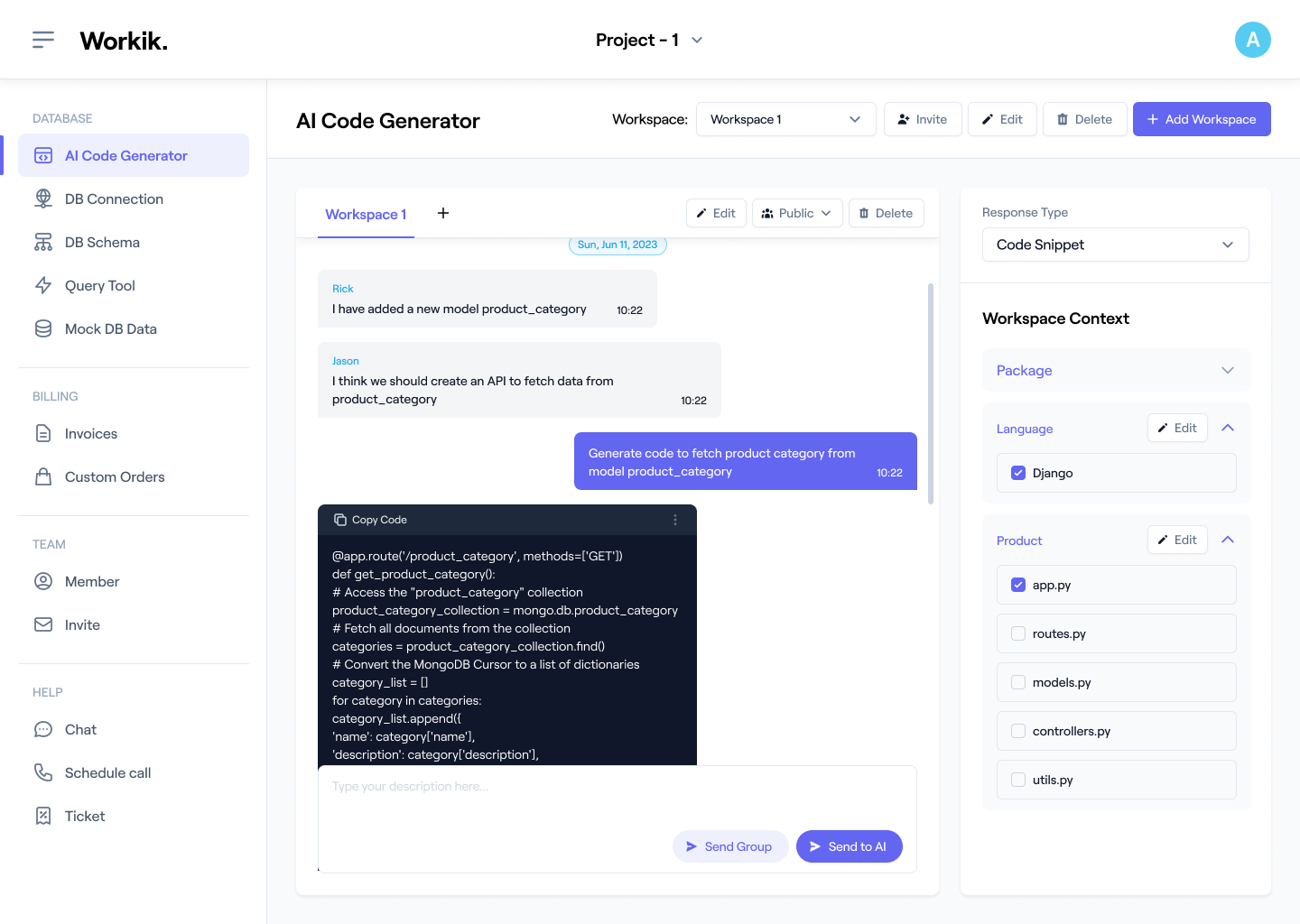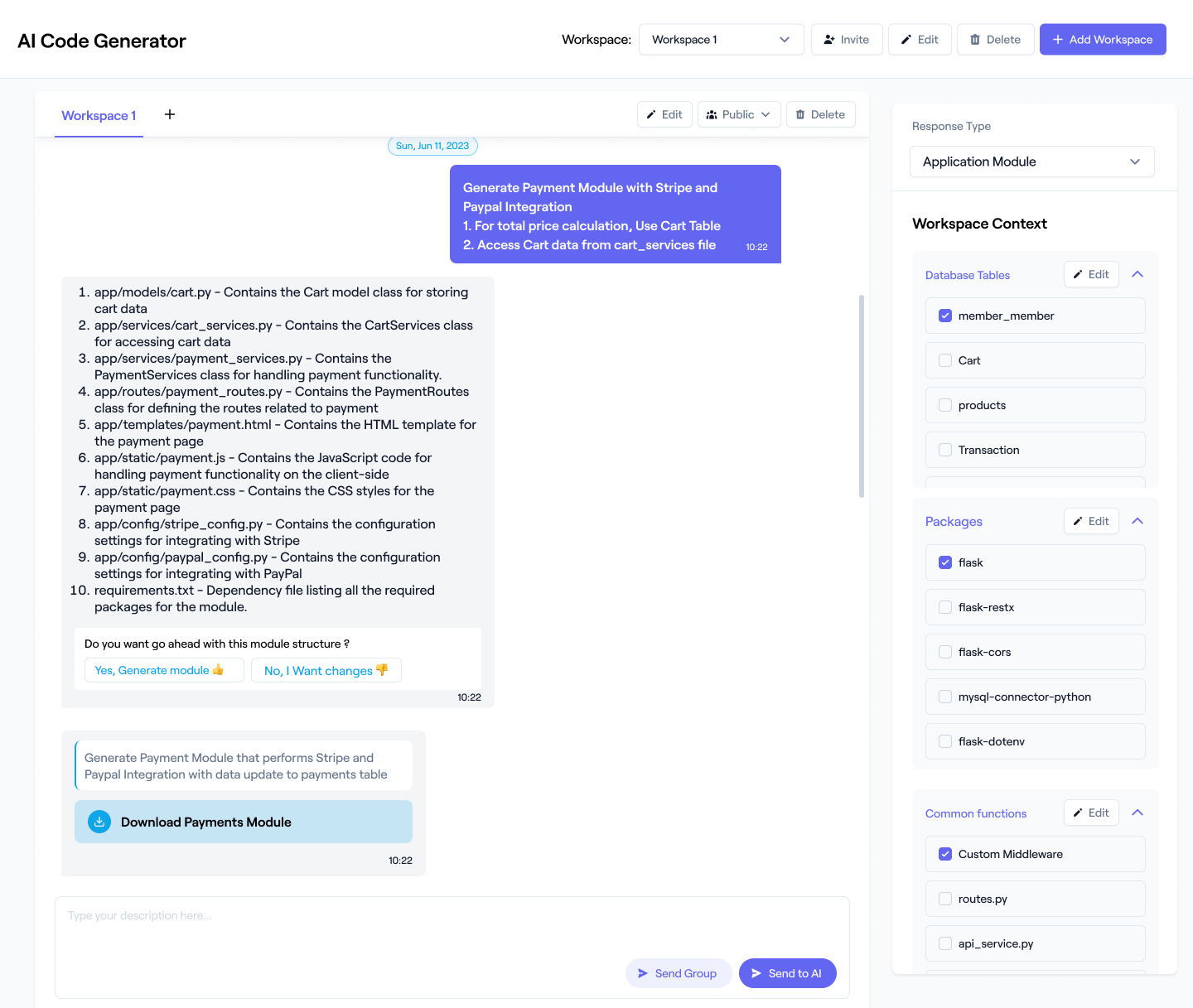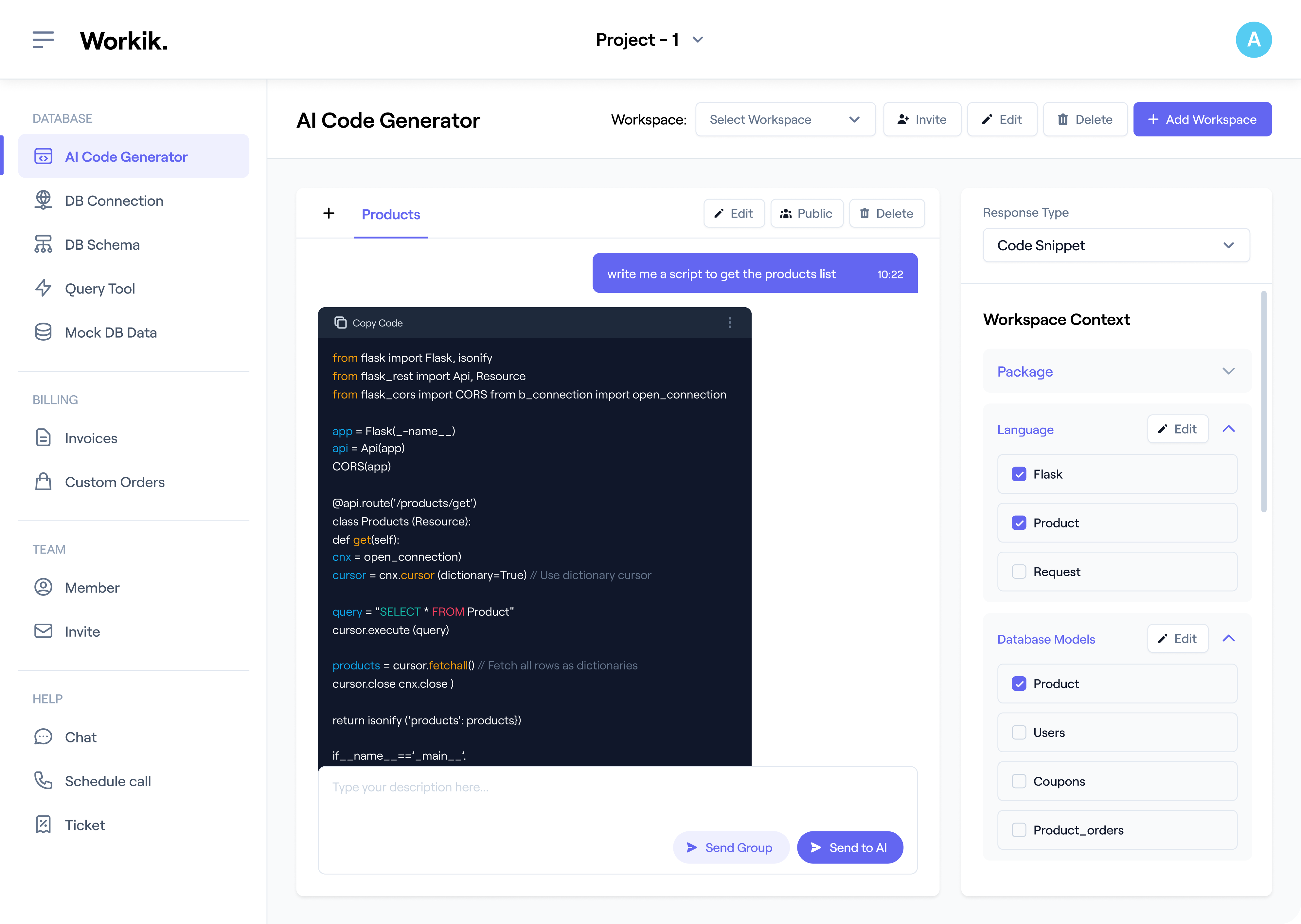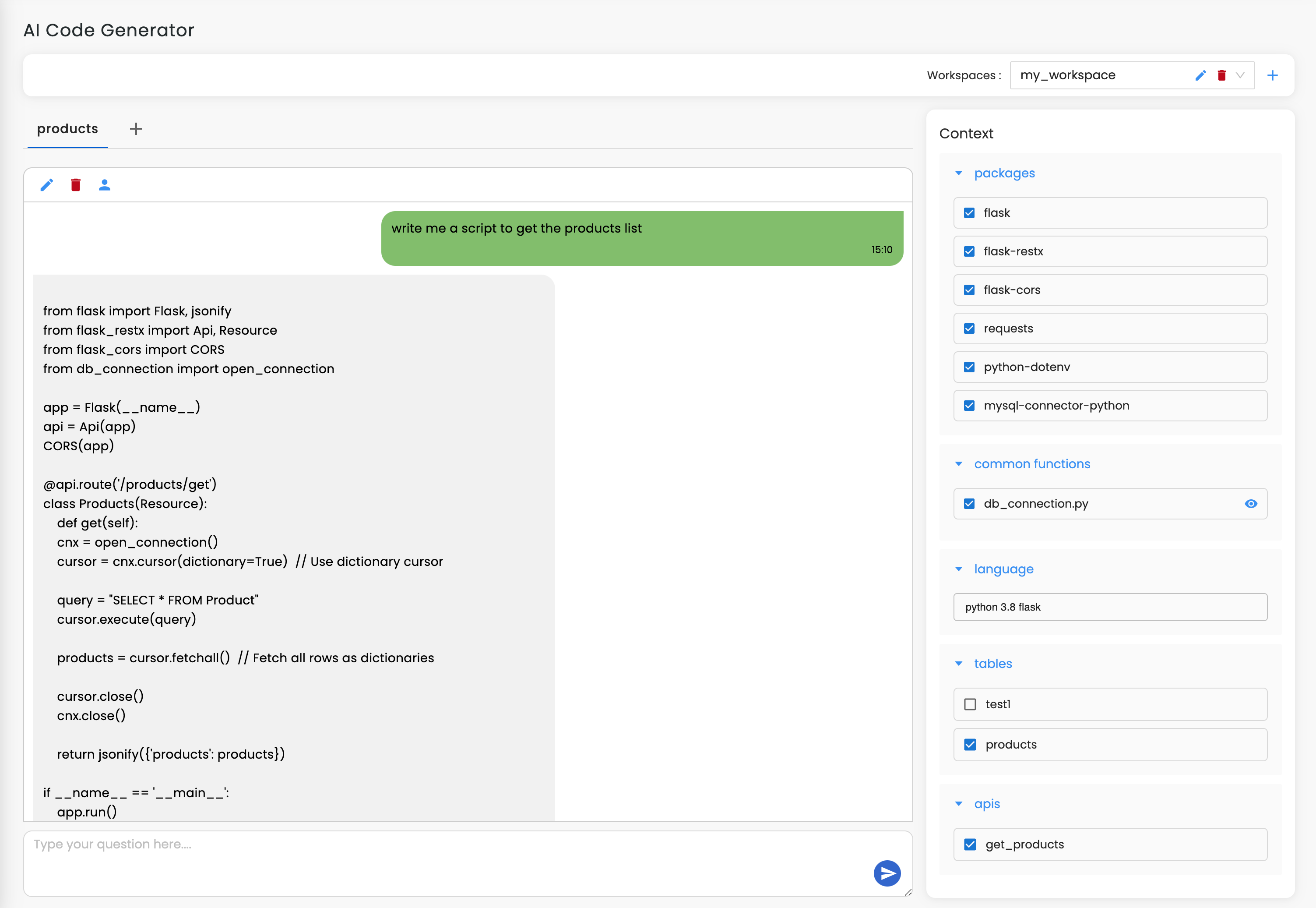
Join our community to see how developers are using Workik AI everyday.
Features

Streamline Cross-Compilation
Automate Zig’s cross-compilation, generating multi-platform executables while AI optimizes toolchains in one seamless step.

Optimize Memory Allocation
AI identifies inefficient memory allocations in Zig, suggesting improvements for custom allocators or bare-metal systems.

Debug Low-Level Code
AI detects memory leaks, undefined behaviour, and concurrency issues in Zig, accelerating system-level bug resolution.

Automate Build Scripts
Generate Zig build scripts and simplify environment configurations, using AI to manage complex setups for faster development.
How it works
Create your free Workik account in seconds to unlock AI-powered tools for Zig development.
Connect your GitHub, GitLab, or Bitbucket repositories. Add Zig-specific contexts like cross-compilation targets, custom allocators, build.zig scripts, and more for AI to better tailor code generation.
Provide your requirements, and AI generates optimized memory allocators, sets up cross-platform builds, and assists in debugging low-level systems or writing bare-metal code with precision.
Invite your team to shared Zig workspaces, collaborate on code refinement, build management, and unit testing.


Expand


Expand


Expand


Expand


Expand


Expand


Expand


TESTIMONIALS
Real Stories, Real Results with Workik
Debugging concurrency issues in Zig took minutes with Workik AI. It even optimized my thread management for real-time performance.

Alex Thompson
Real-Time Systems Programmer
Workik optimized our Zig game engine's memory management, improving performance and frame rates significantly.

Hannah Lee
Game Developer
Workik AI detected a buffer overflow in my networking app before launch, making it a must-have for secure Zig development.

Rahul Desai
Security Engineer
What are some popular use cases of Workik’s AI-powered Zig Code Generator?


Some popular use cases of Workik’s AI-powered Zig Code Generator include but are not limited to:
* Automate cross-compilation for multi-platform builds.
* Generate efficient memory management with custom allocators.
* Debug low-level systems for memory leaks and concurrency issues.
* Create bare-metal code for IoT and real-time applications.
* Optimize Zig for game engines and performance-critical tasks.
What context-setting options are available in Workik’s AI for Zig Code Generation?


Workik offers diverse context-setting options for Zig code assistance, allowing users to:
* Set cross-compilation targets and configure build.zig scripts.
* Integrate with C libraries using Zig’s FFI.
* Sync with GitHub, GitLab, or Bitbucket for codebase integration.
* Automate build configurations for different platforms.
* Manage memory allocators for low-level memory optimization.
What additional benefits does Workik bring to Zig developers?


Workik simplifies cross-compilation by automatically generating builds for multiple targets like ARM, Linux, and WebAssembly. It also offers AI-assisted debugging, identifying memory leaks, undefined behavior, and concurrency issues faster, optimizing your low-level Zig code.
How can Workik AI add value to security and performance in Zig projects?


Workik analyzes and optimizes memory usage and thread management for high-performance and security-critical applications. It detects memory safety issues like buffer overflows, ensuring your Zig code is secure, especially in networking and embedded systems.
What advantages does Workik AI offer for Zig unit testing?


Workik automates unit test creation for Zig, analyzing your project structure and suggesting test cases for critical components, helping catch bugs early and ensuring your low-level code is robust.
Generate Code For Free

Zig: Questions & Answers
Zig is a systems programming language designed for performance and control, ideal for bare-metal programming, operating systems, and embedded systems. It offers manual memory management and cross-compilation with minimal runtime overhead, ensuring precision and efficiency.
Popular tools used alongside Zig include:
Libraries:
Zig Standard Library, Zigmod, LibZig
Build Tools:
Zig Build System, Clang, LDC
Memory Handling:
Zig heap, custom allocators
Development Tools:
Zig Language Server (ZLS), GitHub, Bitbucket
Graphics & Cross-Platform:
Vulkan, Zig cross-compilation for ARM, x86, WebAssembly
Popular Zig use cases include but are not limited to:
Systems Programming:
Build OS kernels, drivers, and low-level utilities.
Embedded Systems:
Write code for resource-constrained environments like IoT.
Cross-Platform Builds:
Target multiple platforms with Zig’s built-in cross-compilation.
Game Development:
Create high-performance engines with manual memory management.
Real-Time Systems:
Develop low-latency, real-time applications.
Career opportunities for Zig developers include Systems Engineer, Embedded Developer, Game Developer, DevOps Engineer, and Security Engineer, each focusing on low-level programming, bare-metal systems, game engine development, cross-platform builds, and security-critical applications in the Zig ecosystem.
Workik AI assists Zig developers by:
Code Generation:
Generate memory allocators, cross-compilation, and system-level code.
Refactoring:
Clean and optimize Zig code for readability and performance.
Build Automation:
Configure build.zig for multi-platform builds, including ARM, x86, and WebAssembly.
Debugging:
Identify memory leaks, undefined behaviors, and concurrency issues.
Memory Optimization:
Enhance custom allocators and memory management.
Dependency Management:
Manage libraries and dependencies using Zigmod.
Code Documentation:
Generate detailed docs for Zig libraries and builds.
Performance Optimization:
Improve threading, concurrency, and execution in real-time systems.
Explore more on Workik
Get in touch
Don't miss any updates of our product.
© Workik Inc. 2026 All rights reserved.

